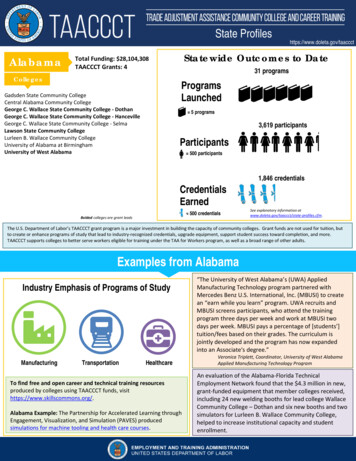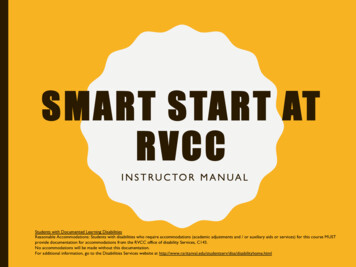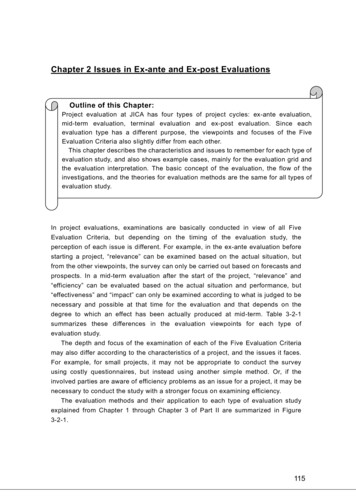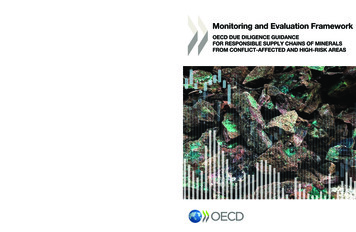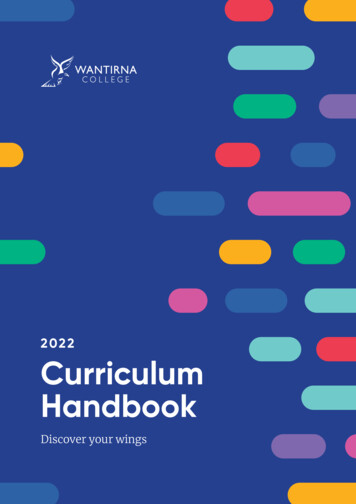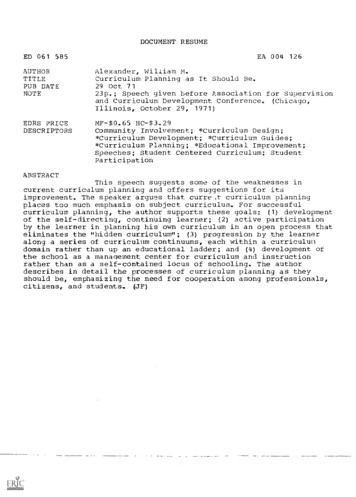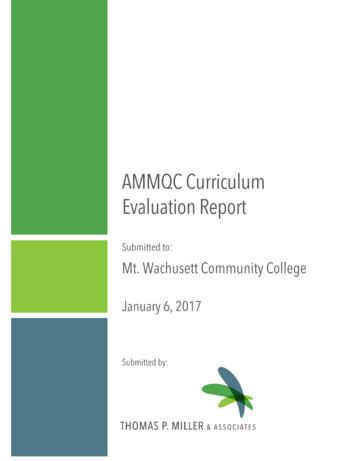
Transcription
AMMQC Curriculum Evaluation ReportIntroduction .3Methodology .3Site Visit Summary: Bossier Parish Community College .4Background .4Technical Competency Area (TCA) in Advanced Manufacturing and Mechatronics.4Certificate of Technical Studies in Advanced Manufacturing and Mechatronics .5Strengths.5Opportunities .6Site Visit Summary: Mt. Wachusett Community College .6Background .6Industry Readiness Training .7Quality Systems Training (QST) and Analytical Laboratory and Quality Systems (ALQS) Certificate .7Mechatronics Programs (Automation Technician Training (ATT), Mechatronics Certificate, andManufacturing Technology—Plastics Degree) .8Strengths.8Opportunities .9Site Visit Summary: North Central State College.10Background .10Industrial Technology .10Industry Alignment .11Strengths.11Opportunities .12Site Visit Summary: Southwest Tennessee Community College .12Background .12Machining Technology.12Strengths.13Opportunities .13Consortium Overview and Recommendations.13Appendix .15Bossier Parish Community College Rubrics .15Page 1
AMMQC Curriculum Evaluation ReportMount Wachusett Community College Rubrics .40North Central State College Rubrics .94Southwest Tennessee Community College Rubrics .151Page 2
AMMQC Curriculum Evaluation ReportIn 2014, the Advanced Manufacturing, Mechatronics, and Quality Consortium (AMMQC) members—MountWachusett Community College (MWCC), Bossier Parish Community College (BPCC), North Central StateCollege (NCSC), and Southwest Tennessee Community College (STCC)—received a TAACCCT grant of 15,875,432 to develop a series of career pathways in Advanced Manufacturing. The following report is athird-party analysis of the curriculum developed or updated through the grant period.Thomas P. Miller and Associates (TPMA) reviewed courses and evaluated them utilizing a customized rubricto assess the quality of curriculum deliverables, including: Syllabus for each course,Course outcomes,Assessments for the course,Schedule and credit policies.The rubric served to determine if a course meets grant requirements as well as college and industry needs.The rubric was also used to assess the quality of curriculum deliverables to ensure the curriculum is readyto be shared via www.SkillsCommon.org. The rubric examines the following categories: Course overview: Using course syllabus as well as program details available online and in printmarketing materials, determine the availability and quality of information provided to studentsprior to beginning a course.Learning objectives: Ensure that learning objectives are clearly stated, student-oriented, andmeasureable.Assessment and measurement: Review syllabus, quizzes, exams, and other graded materials toassess alignment to learning objectives and overall effectiveness.Course technology (including equipment): Observe labs and other learning environments in orderto ensure technology promotes active learning and aligns to learning objectives.Learner support: Using course syllabus as well as program details available online and in printmarketing materials, determine the level of student support available at the college and within theprogram or course.Industry alignment and credentials: Using data from industry specific associations, skills-basedtextbooks, O*net Online, and other sources, determine if the curriculum aligns to industry demandand related certifications.Instructional materials (optional): Review learning resources to determine how effectively theyblend with the required course competencies and the assessments used to determine studentsuccess.Course activities and learner interaction (optional): Review classroom-based activities for effectivealignment to learning objectives and assessments.Online courses (optional): If applicable, review a sample of online course materials to assess qualityand clarity of instruction.Other (optional): Questions in the “other” category assess involvement of industry professionals aswell as qualifications of instructors.Page 3
AMMQC Curriculum Evaluation ReportFollowing the review of written materials, TPMA conducted site visits at the four AMMQC partner colleges.At each site visit, the third party evaluators met with program staff and faculty, toured lab space, and askedfollow-up questions to better understand the programs and courses. In many cases, the site visits resultedin the collection of updated or additional written materials, which were factored into the rubrics after thevisit.The following site visit summaries provide a narrative account of the evaluators’ findings based on both thewritten review and the site visit. When applicable, the evaluator has highlighted best/promising practicesand recommendations for improvement. The full rubrics are available in the appendix (beginning on page14).Bossier Parish Community College (BPCC), a 2-year community college located in northwest Louisiana, hasdeveloped and updated courses in Advanced Manufacturing and Mechatronics in order to respond to thegrowing and diversifying industries in the region. Three levels of training are available: a short termTechnical Competency Area, a one-year Certificate of Technical Studies, and a two-year associate’s degree.Each of these programs is stackable and aligned to industry-recognized credentials. For this report, thefollowing courses were reviewed: AMFG 100 – Introduction to ManufacturingAMFG 102 – Tools and Equipment Used in ManufacturingAMFG 104 – AutomationAMFG 106 – Introduction to Fabrication, Process Technology, and MachiningAMFG 110 – Manufacturing Materials and MethodsTEED 150 – PneumaticsTEED 153 – Hydraulics/Fluid DynamicsTEED 208 – Programmable Logic ControllersTEED 210 – Robotic Control SystemsTEED 252 – Electric Motor ControlsTEED 260 – Mechatronics Level ITPMA met with BPCC staff and faculty on November 2, 2016 after reviewing the courses above. Theevaluators’ questions focused on better understanding alignment between courses and credentials, as wellas the nature of in-class instruction and activities not fully described in the syllabi. Following the staff andfaculty interviews, the evaluators received a lengthy tour of the AMMQC funded labs, which house anumber of Amatrol trainers, Siemens and Allen controls, and computer workstations for student use. Thelabs and classrooms were well organized and set up to maximize students’ active learning.The one-semester, 12 credit TCA is designed to provide students with a broad overview of themanufacturing sector in northwest Louisiana, with introductions to several key manufacturing processes(machining, welding, process technology, and mechatronics), allowing for students to quickly gain the skillsneeded to be employable and/or master the foundational competencies needed to be successful in adegree-granting program.Page 4
AMMQC Curriculum Evaluation ReportThe TCA is unique in that it aligns with the state of Louisiana’s C4M (Certificate for Manufacturing), whichwas developed by Louisiana Economic Development (LED). The courses included in this certificate (AFMG100, 102, 104, and 106) incorporate C4M exams and curriculum while also aligning to the ManufacturingSkill Standards Council (MSSC) Certified Production Technician (CPT) standards. AFMG 100 aligns with theMSSC Safety module, 102 with Quality, 104 with Manufacturing Processes, and 106 with MaintenanceAwareness. Notably, while the courses align to the standards, students at BPCC do not all attempt the MSSCcertification exams.Stacking upon the TCA, the Certificate of Technical Studies (CTS) is a 33 credit hour, one-year program.Successful students complete both the TCA and the CTS, and occasionally attempt the MSSC CPTcertification exams. BPCC staff indicate that they plan to have all students take the MSSC CPT assessmentsin the future; this aligns with national best practices in alignment to industry-recognized credentials.In addition to courses in advanced manufacturing, students in the Certificate of Technical Studies take adeeper dive into Mechatronics skills. These are covered by the six TEED courses reviewed (as noted above).Students in TEED 260 are able to earn the Siemens Level 1 Certification. The AMFG and TEED courses arealso required for students pursuing the Advanced Manufacturing and Mechatronics concentration in thetwo-year associate’s degree in Industrial Technology.TPMA’s evaluation revealed that BPCC’s new and updated courses show strong alignment to industrytrends in technology and training. Based on the following strengths, we believe BPCC AdvancedManufacturing and Mechatronics students are being adequately prepared for employment in themanufacturing industry: Those individuals who are not academically prepared for the TCA can begin with the non-creditIndustrial Readiness Training, which BPCC has increased its focus on;Instructors are committed to providing a variety of learning opportunities. In addition to hands-onexercises with Amatrol and Siemens trainers, students have written assignments, quizzes, andexams. For example, students in AMFG 100 are required to write and discuss a safety brief todemonstrate their understanding of safety processes taught in the course;Curriculum includes soft skills such as teamwork, communication, professional norms, etc. Programadministration credits instructors with quality of program and graduates. Instructor models workethic, professionalism, integrity;The majority of TEED students who have attempted Siemens certification have been successful;Students in the degree program have opportunities for summer internships, providing the hands-ontraining that is essential for career readiness;Advisory council includes representatives from a variety of industry sub-sectors. Members providefeedback on course content and sequencing and approve all changes. For example, membersrequested troubleshooting and now 11 credit hours include troubleshooting as learning outcome;Efforts towards sustainability: company sponsored classrooms, seeking endowed professorship;LED is co-located (considered a national best practice) and sits on advisory board.Page 5
AMMQC Curriculum Evaluation Report Overall, the syllabi reviewed for BPCC lacked detail regarding grading policies and how assessmentsare tied to learning objectives. For example, the AMFG 100 syllabus states under courserequirements: “Complete all homework assignments, in-class equipment exercises, in class tests,and final exam;” however, the syllabus does not indicate how scores are tied to the previouslymentioned course components.In the assessments reviewed, there is an overreliance on multiple choice questions. Based upon ourdiscussion with staff and instructors, students’ overall performance is measured on more than justthe outcomes of these exams; however, this is not explicitly stated in the materials reviewed.There is very little explanation of how and why courses are aligned with industry certifications inthe written course material. We recommend providing additional detail regarding the C4M, MSSCCPT, and Siemens certifications in the appropriate courses.Mount Wachusett Community College is a public two-year institution serving 29 cities and towns in NorthCentral Massachusetts. AMMQC is housed at the Devens campus, where new programs in Mechatronicsand Quality Control have launched. Programs offered at MWCC include short term, non-credit programs:Industrial Readiness Training (IRT), Quality Systems Training (QST), and Automation Technician Training(ATT); two 1-year Certificate Programs: Analytical Laboratory and Quality Systems (ALQS) andMechatronics; and two associate degrees: Manufacturing Technology-Plastics and Biotechnology-ALQSconcentration. The following MWCC courses and non-credit certificates were reviewed: Industrial Readiness TrainingQuality Systems TrainingAutomation Technician TrainingCAD101 – Intro to CADEET103 – Industrial Electrical MaintenanceMET 220 – Introduction to Robotics in AutomationPLT101 – Introduction to Automated Mechanical ProcessesPLT104 – Introduction to Programmable Logic ControlsPLT105 – Blueprint ReadingPLT128 – Hydraulics and PneumaticsPLT130 – Injection Molding & ExtrusionPLT220 – Statistical Process ControlPLT223- Production DesignPLT224 – Principles of SupervisionPLT226 –Materials Design and ApplicationAQS 110 - Introduction to MetrologyAQS 115 - Quality Systems and Auditing PrinciplesAQS200 - Conducting Root Cause AnalysisCHE180 - Instrumental AnalysisPage 6
AMMQC Curriculum Evaluation ReportTPMA completed a site visit at MWCC Devens Campus on November 8, 2016. The interview focused onclarifying questions regarding the syllabi and assessments provided, as well as a discussion of the studentsupport services and industry advisory council involvement in the AMMQC-related programs. A tour of theAMMQC funded labs and classrooms followed. During the tour, evaluators and staff discussed the use oftechnology in individual courses, teaching methods, and alignment to industry. The labs are set up toreplicate a manufacturing workplace as much as possible and appear to be conducive to active, hands-onlearning.Industry Readiness Training (IRT) sets out to introduce students to the essential skills required by diversemanufacturers and entry-level occupations. To that end, IRT is aligned to OSHA 10, the industry standard insafety certifications, as well as the National Career Readiness Certificate. Students also take the Safety andQuality assessments which are two of the four modules that make up the Manufacturing Skill StandardsCouncil (MSSC) Certified Production Technician (CPT).MWCC staff report that students struggle with the MSSC exams, and they are not happy with the currentlevel of success in this area. Earlier assessment of the IRT curriculum completed by TPMA and theManufacturing Institute indicate that the program is “fairly well aligned” with MSSC’s safety module, butnot fully. This is reflected in the lower-than-anticipated test scores. Staff expressed concern that MSSC CPTrequires some industry experience in addition to the classroom instruction. Use of the MSSC onlinecurriculum may close this gap. Instructors can also review the MSSC test scores to identify which categoriesstudents are struggling with—this may help them to identify which topics need more instruction.Students may be better served by placing the MSSC Quality certification within an academic class (like AQS110) or the Quality Systems Training (QST) program.MWCC offers a two-week, intensive quality program (Quality Systems Training) and a one-year qualitycertificate (Analytical Laboratory and Quality Systems). At this time, the QST provides a high-level survey ofthe topics covered in the longer program; it is designed for individuals with some industry experience andthe ability to move quickly through the course material.The goal is for students who complete the QST to earn credit for Introduction to Quality and Metrology(AQS 115) through a challenge exam. TPMA reviewed the curriculum for both courses as well as thechallenge exam. Our evaluation indicates that the challenge exam is fully aligned to ASQ 110, and as such, apassing grade on this exam would show equivalent prior learning.MWCC staff have concerns about New England accreditation, particularly the validation of academic rigor,and wondered if the challenge exams would maintain the course’s accreditation. According to the NewEngland Association for Schools and Colleges:Credit for prior experiential or non-collegiate sponsored learning is awarded only with appropriateoversight by faculty and academic administration and is limited to 25% for credentials of 30 credits orfewer. When credit is awarded on the basis of prior experiential or non-collegiate sponsored learningalone, student learning and achievement are demonstrated to be at least comparable in breadth,depth, and quality to the results of institutionally provided learning experiences. The policies andPage 7
AMMQC Curriculum Evaluation Reportprocedures for the award of credit for prior or experiential learning are clearly stated and available toaffected students. 1Although TPMA is not qualified to say with certainty whether or not the challenge exam will maintainaccreditation, our interpretation of the above policy is that the challenge exam, which was developed andapproved by MWCC faculty, and which has been shown to be “at least comparable in breadth, depth, andquality” based on our curriculum review, would meet the standards of academic rigor required by theaccrediting body.TPMA’s review of the quality certifications suggests strong alignment to industry demand as measured bythe American Society for Quality standards. When MWCC quality students complete their certificates, theymay be able to attempt the ASQ Certified Quality Process Analyst (CQPA) or Certified Quality ImprovementAssociate (CQIA). Although the curriculum is strongly aligned with these certifications, it is important tonote that the ASQ requires some work experience prior to certification. We understand that the workexperience requirement is broadly applied and does not have to be manufacturing related.The courses in the one-year quality certificate can also be applied to a two-year degree in Biotechnologywith a concentration in Analytical Laboratory and Quality Systems.The mechatronics programs at MWCC respond to the rising need for workers with an understanding ofautomation, robotics, and process control. On this track, students have access to simulations and trainersthat are current with today’s technology trends, and the curriculum is nimble enough to adapt to students’changing needs. With three options ranging from six weeks to two years, the mechatronics pathway hasappropriate options for a variety of learners.Much of the technology used in the classrooms and labs comes from Amatrol, and as such, comes withprepared curriculum, assessments, and activities from Amatrol. The MWCC faculty recognize some of thestandard texts are geared to comprehensive coursework that includes higher level content than MWCCprovides; however, they have found the material accessible and valuable to the students. Curriculumdevelopers and instructors actively review materials to select most applicable portions of a text,demonstrating the responsiveness and adaptability MWCC has infused into the packaged learningresources.Overall, TPMA finds that the mechatronics curriculum and related technology used at MWCC is well alignedwith industry demand.Based upon TPMA’s evaluation of the AMMQC courses and non-credit programs offered at MWCC, we havedetermined that the curriculum shows strong industry alignment. We also note the following programmaticstrengths: 1MWCC instructors take a unique attitude toward using the new training equipment, noting that anatural part of the training is for students to troubleshoot faults inserted into the equipment tandards for Accreditation.pdfPage 8
AMMQC Curriculum Evaluation Report learning activities. Students must learn to identify why and how the machine broke and how to fixthe problem.Students at MWCC have the full support of their instructors. When students with full time jobs getcalled into work and have to miss class, one instructor will come in on Saturdays to allow studentsto use the lab. They can also come in to study and practice anytime that staff is in the lab.Faculty at MWCC come from industry and have active relationships with local manufacturers andindustry organizations such as ASQ. This gives students access to a broad network of potentialmentors and employers.As noted above, instructors are also curriculum designers, and so are able to continuously improvecourses as they teach.Challenge Exams for ALQS courses did a great job aligning assessments to learning outcomes andutilized a variety of assessment methods (Best practices: AQS 200 and CHE180).Students are able to take core academic courses at both MWCC’s main campus and the Devenscampus, depending on their schedule and convenience.Regarding industry alignment: the staff has strong connections to medical device, plastics, andother manufacturing businesses, and meets monthly with industry representatives.The Mechatronics Programs website (https://mwcc.edu/manufacturing/programs/) is welldesigned, easy to navigate, and contains a wealth of relevant information for current andprospective students. In addition, the website provides links programs to MWCC’s Career Coachsite, which provides information on related occupations.MWCC stated that a regional task force has recently formed to explore how colleges can connectwith school systems to create a true pathway. Taking an active and/or leadership role in this groupwould allow MWCC to maximize the work that has been done through AMMQC whilesimultaneously bolstering their enrollment. For instance, MWCC could help the task force to betteraddress the need for manufacturing awareness throughout K-12 institutions.The MWCC Advisory Board is made up of VPs, CEOs, and executives from 11-12 different industrypartners. It can be beneficial to complement these high-level leaders with front-line / floor-levelstaff for effective input on curriculum. Local ASQ members, quality technicians, etc., may have abetter understanding of the real day-to-day skill needs for entry-level workers.There is very little explanation of how and why courses are aligned with industry certifications inthe written course material. We recommend providing additional detail regarding MSSC CPT, ASQCQPA and CQIA, and PMMI.The Automation Technician Training (ATT) is not listed as an offered program on the Mechatronicsprograms website. Materials reviewed for the ATT program were vague or unclear as to thepurpose of the program and possible career opportunities for participants. The ATT program alsohas an opportunity to align to the MSSC Maintenance Awareness and Safety credentials.The PLT degree program description notes that students must first complete a set of core technicalcourses at Nypro. It is unclear whether these are prerequisite courses or if students complete PLTcourses at Nypro, Inc.Page 9
AMMQC Curriculum Evaluation ReportNorth Central State College (NCSC) is a public two-year, community-based educational institution servingthe residents of north central Ohio. Through the AMMQC grant, NCSC has updated the offerings in itsIndustrial Technology division, including the Associate of Applied Science in Integrated Engineering (whichprovides students with instruction in Programmable Logic Controls (PLCs), Automation and Robotics, andMechatronics) and Mechatronics Certificate.TPMA evaluated the courses designed and updated through the AMMQC funding, including: EMMT 1010-01 Industrial ElectricityEMMT 1020-901 Mechanical SystemsEMMT 1030-40 OSHA Safety RegulationsEMMT1050-901 Fundamentals of Fluid Power DistributionEMMT 2100-01 Advanced Fluid Power SystemsEMMT 2250-01 Advanced PLCSEMMT 2300-40 National Electric CodeEMMT 2400-40 Control ProcessesELET 1510-30 DC ElectricityELET 1710-30 Introduction to RoboticsEMMT 2100-901 Advanced Fluid Power SystemsELET 2150-01 Motor ControlsELET 2240-40 Programmable Logic ControllersMECT 1750-30 Hydraulics and PneumaticsMECT 2330-01 StaticsMFGT 1120-01 Advanced MachiningMFGT 1300-30 Welding and Welding EquipMFGT 1550-01 CNC SetupMFGT 1640-01 Computer Aided ManufacturingMFGT 2010-30 Jig and Fixture DesignMFGT-2250-40 Stamping Operations and Die DesignMFGT 2640-920 Computer Aided Manufacturing IITPMA conducted a site visit at NCSC on October 31, 2016. The evaluators met individually with threeinstructors, each of whom provided a tour of his lab and classroom while discussing his teaching philosophyand use of assessments and technology. A fourth instructor was interviewed via phone after the visit. TPMAalso met with program staff to discuss overall goals of the visit, use of Amatrol online courses, and anoverarching interest in better understanding how the new and updated curriculum aligns to industrydemand.The AMMQC funded equipment is spread over two floors in the Kehoe Center in Shelby, Ohio. All classroomand lab space was well organized and designed so that students could work individually with oversight frominstructors. The curriculum invites this arrangement as most classroom work is based upon online modulesP a g e 10
AMMQC Curriculum Evaluation Reportpurchased from Amatrol. These online units are supplemented by workbooks which are stored in theclassrooms for easy access. The instructors observe students as they complete the online and hands-onactivities, and provide verbal feedback in real time. Numerical grades are recorded in the school’s learningmanagement system.In response to NCSC’s request for a more detailed evaluation of the programs’ alignment to industrydemand, TPMA reviewed the job posting data for four occupations (as noted on the NCSC integratedengineering webpage: ted-engineering): Electrician,Electrical and Electronics Repairer, Industrial Machinery Mechanic, and Maintenance Worker, Machinery.2Our analysis shows that the courses evaluated provide instruction in 100 percent of the top ten hard skillsrequired for these occupations, as indicated in the table below.Top Hard SkillsRepairing (Computer Systems)MaintenanceTestingMotorsElectrical WiringsMachineryTroubleshooting (Problem Solving)Electrical SystemsHydraulicsTransformers (Electrical) 2NCSC CoursesEMMT 2250, ELET 1710, ELET 2240, MFGT 1640and 2640All courses in Industrial Maintenance CertificateAll courses reviewedEMMT 1020, ELET 2150EMMT 2300, ELET 1510Multiple CoursesAll courses reviewedEMMT 1010 and othersMECT 1750EMMT 1010 and othersStudents develop the ability to program Fanuc controls and other basic robotic functions.Instructors are working to finalize the certification process and looking into badges for specificskills.Students keep all their work in 3 ring binders—this can be used as a portfolio and/or to help themprepare resumes and prepare for interviews.Faculty at NCSC come from industry and have active relationships with local manufacturers. Thisgives students access t
deeper dive into Mechatronics skills. These are covered by the six TEED courses reviewed (as noted above). Students in TEED 260 are able to earn the Siemens Level 1 Certification. The AMFG and TEED courses are also required for students pursuing the Advanced Manufacturing and Mechatronics concentration in the


